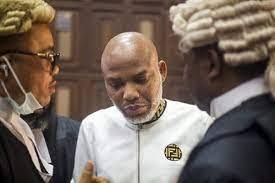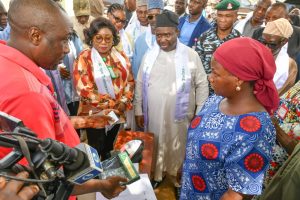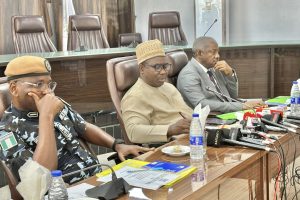Abuja – The Indigenous People of Biafra (IPOB), a separatist group campaigning for the secession of south-eastern Nigeria, has fiercely rejected a court judgment sentencing its leader, Nnamdi Kanu, to life imprisonment.
In a ruling delivered on Thursday at the Federal High Court in Abuja, Justice James Omotosho found Mr Kanu guilty on seven terrorism-related charges. The court held that Mr Kanu’s broadcasts on the outlawed Radio Biafra and his directives enforcing regional “sit-at-home” orders constituted acts of terrorism.
‘Self-determination is not a crime’
In a defiant statement issued on Friday, IPOB spokesman Emma Powerful insisted that Mr Kanu had “committed no offence known to Nigerian law.”
The group maintains that their leader is a political prisoner and that his agitation for an independent state of Biafra amounts to a right to self-determination protected by international conventions, rather than terrorism.
“For the avoidance of doubt, no gun, no grenade… and no attack plan was ever found on Mazi Nnamdi Kanu,” the statement read. “Agitation is not terrorism, and requesting a referendum is not a weapon.”
Legal dispute
IPOB accused the trial judge of relying on repealed legal provisions and ignoring Section 36(12) of Nigeria’s 1999 Constitution, which protects citizens from being convicted of offences not clearly defined in written law.
“The IPOB wishes to inform the global community… that we shall, in the coming days and weeks, lay bare the fundamental defects, contradictions, and illegalities that define the recent ruling,” the group stated.
The court had accepted prosecution evidence linking Mr Kanu to attacks on security personnel carried out by the Eastern Security Network (ESN), the paramilitary wing of IPOB. However, the group argues that violence and insecurity in the South-East escalated while Mr Kanu was already in state custody, blaming Nigerian security forces for the unrest.
Historical tensions
Mr Kanu, a British-Nigerian national, has been a polarising figure in Nigeria. His detention has frequently sparked unrest in the south-east of the country.
The ruling comes amid ongoing tensions in the region, where memories of the 1967-1970 civil war—in which more than a million people died after the region attempted to secede as the Republic of Biafra—remain highly sensitive.
IPOB says it will now engage international bodies regarding the judgment and has reiterated its demand for a United Nations-supervised referendum on independence.





Add Comment